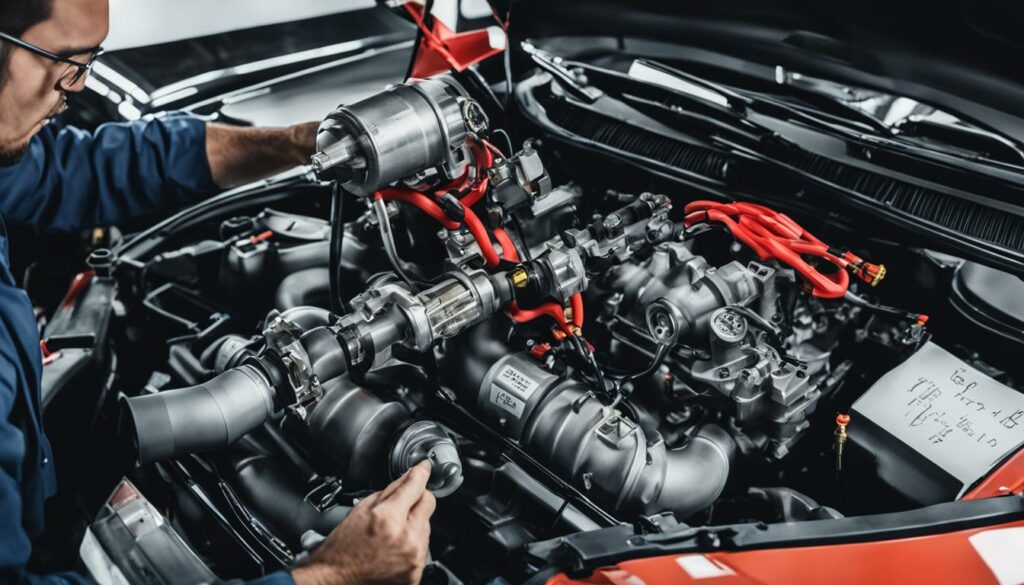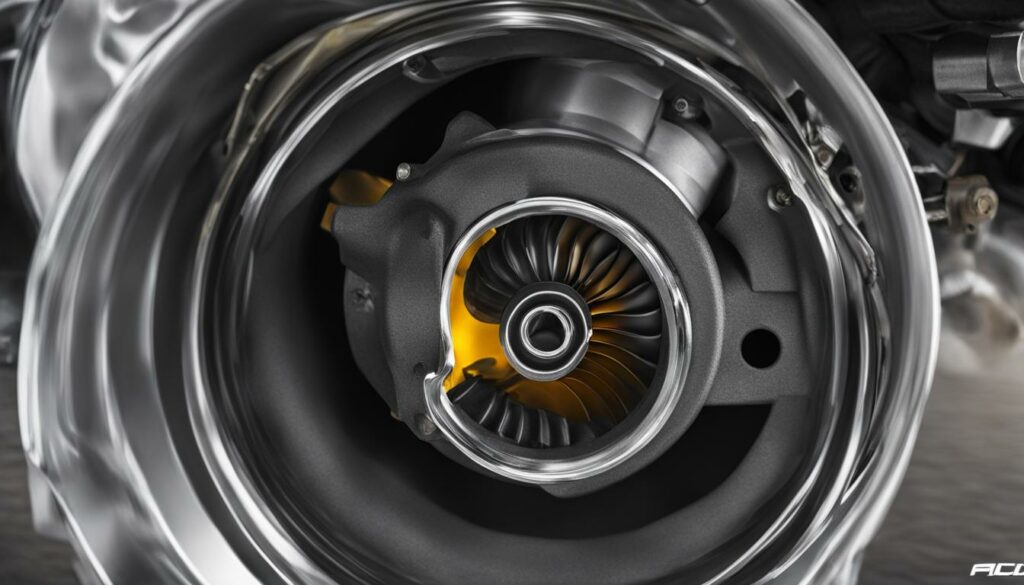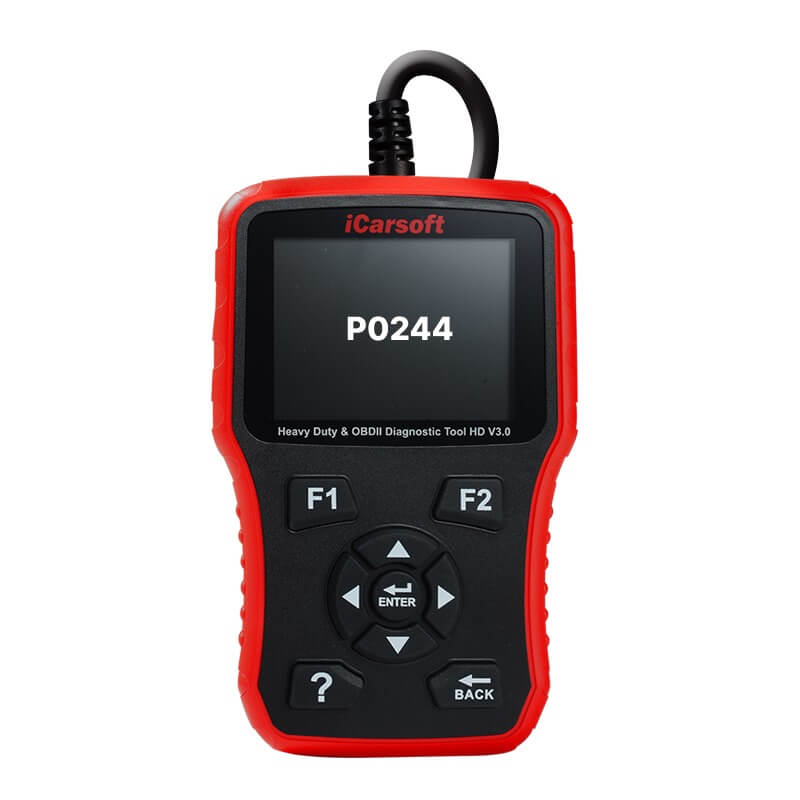P0244 – Turbocharger Wastegate Solenoid A High
POSTED IN pcodes
Welcome to our article on the P0244 code, which relates to the Turbocharger Wastegate Solenoid A High. If you are experiencing issues with your turbocharged or supercharged engine, this diagnostic trouble code might provide some insights into the problem. The P0244 code indicates a problem with the total boost range or engine-related performance, which cannot be attributed to other circuit failures.
This code can be triggered by various factors, including wastegate solenoid failure, wiring issues, or a malfunctioning Powertrain Control Module (PCM). A lack of turbo/supercharger boost is a common symptom of this code, leading to reduced engine performance and power. When faced with the P0244 code, it is essential to diagnose the specific cause and take appropriate measures to resolve it.
Key Takeaways:
- The P0244 code is associated with turbocharged and supercharged engines.
- It indicates an issue with the total boost range or engine-related performance.
- Common causes include wastegate solenoid failure, wiring issues, or a malfunctioning PCM.
- A lack of turbo/supercharger boost is a common symptom.
- Diagnosis and appropriate repairs should be performed based on the vehicle’s specifications.
Common Causes of the P0244 Code
When your vehicle’s diagnostic system detects the P0244 code, there are several common causes that could be behind it. Understanding these causes can help you identify and resolve the issue effectively.
- Wastegate Solenoid Failure: A failure in the wastegate solenoid can prevent proper control of the wastegate, leading to issues with boost pressure. This can ultimately trigger the P0244 code.
- Wiring Issues: Problems with the wiring, such as a shorted or open circuit, can disrupt the communication between the solenoid and the PCM (Powertrain Control Module). These wiring issues can contribute to the occurrence of the P0244 code.
- Malfunctioning PCM: A malfunctioning PCM may not properly control the solenoid, which can result in a performance issue and the activation of the P0244 code. The PCM plays a crucial role in managing the solenoid’s operation.
Identifying the specific cause of the P0244 code in your vehicle is vital for effective troubleshooting and repair. Now that you understand the common causes, you can take the necessary steps to diagnose and address the issue.

Buy tested tuning file for Adblue / EGR / DPF / Adblue off now!
Common Symptoms of the P0244 Code
A common symptom of the P0244 code is a lack of turbo/supercharger boost. This can result in reduced engine performance and power. The engine may feel sluggish and may struggle to accelerate properly. Drivers may also notice a decrease in overall engine responsiveness.
Another symptom of the P0244 code is the activation of the Malfunction Indicator Light (MIL) or a warning message on the instrument cluster. This indicates that there is an issue with the turbocharger wastegate solenoid A high, which requires attention. Ignoring these warnings can lead to further damage to the engine and other components.
It is important to note that symptoms may vary depending on the specific vehicle and its system configurations. Factors such as the make and model of the vehicle, as well as the severity of the issue, can influence the presenting symptoms. If you experience any of these symptoms or suspect an issue with your turbocharger wastegate solenoid, it is recommended to have your vehicle diagnosed by a qualified mechanic to prevent further damage.
Common Symptoms of the P0244 Code:
- Lack of turbo/supercharger boost
- Reduced engine performance and power
- Sluggish acceleration
- Activation of the Malfunction Indicator Light (MIL) or warning message
Understanding the common symptoms associated with the P0244 code can help you identify potential issues with your vehicle’s turbocharger wastegate solenoid. Prompt diagnosis and repair can prevent further damage to your engine and ensure optimal performance.

How to Diagnose and Fix the P0244 Code
Diagnosing and fixing the P0244 code can vary depending on the specifications of your vehicle and its system configurations. To diagnose the issue, you’ll need to use a scan tool that can retrieve and analyze the diagnostic trouble codes (DTCs) stored in the Powertrain Control Module (PCM). This will provide you with a better understanding of the specific fault causing the P0244 code.
The next step is to inspect the wastegate solenoid and its wiring for any visible damage or issues. The wastegate solenoid is responsible for controlling the wastegate, which regulates the boost pressure in turbocharged engines. Look for any signs of wear, corrosion, or loose connections. If any problems are found, they should be addressed accordingly.
Expert Tip: Testing the solenoid and the related circuits may also be necessary to determine the exact cause of the P0244 code. Using a multimeter, you can check for continuity, resistance, and proper voltage across the solenoid and its connectors.
Once you have identified the cause of the P0244 code, appropriate repairs can be made to resolve the issue. This could involve replacing a faulty wastegate solenoid, repairing damaged wiring, or addressing any other component that may be contributing to the problem. If you’re unsure about the diagnosis or don’t have the necessary tools and expertise, it’s recommended to consult with a qualified mechanic or technician for assistance.
Remember, fixing the P0244 code requires accurately diagnosing the underlying cause. It’s important to address the issue promptly to prevent further damage to your vehicle’s engine or turbocharger system. By following the necessary diagnostic steps and making the appropriate repairs, you can resolve the P0244 code and restore your vehicle’s performance.
Conclusion
In conclusion, the P0244 code is a common diagnostic trouble code that is typically found in turbocharged and supercharged engines. This code indicates an issue with the total boost range or engine-related performance. The most common causes of the P0244 code include wastegate solenoid failure, wiring issues, or a malfunctioning PCM.
To diagnose and fix the P0244 code, it is important to determine the specific cause based on the vehicle’s specifications. This may require professional assistance and the use of a scan tool to retrieve and analyze diagnostic trouble codes stored in the PCM. Inspecting the wastegate solenoid and its wiring for any visible damage or issues, as well as testing the solenoid and related circuits, may be necessary to pinpoint the exact cause.
Once the cause is identified, the appropriate repairs can be made. This may involve replacing a faulty solenoid or addressing any wiring issues. It is essential to follow the vehicle manufacturer’s specifications and procedures to ensure proper diagnosis and repairs.
FAQ
What is the P0244 code?
The P0244 code is a generic powertrain/engine diagnostic trouble code that indicates an issue with the total boost range or engine-related performance. It is commonly associated with turbocharged and supercharged engines.
What are the common causes of the P0244 code?
Common causes of the P0244 code include wastegate solenoid failure, wiring issues, or a malfunctioning PCM (Powertrain Control Module).
What are the common symptoms of the P0244 code?
Common symptoms of the P0244 code include a lack of turbo/supercharger boost, reduced engine performance, activation of the Malfunction Indicator Light (MIL), or a warning message on the instrument cluster.
How can the P0244 code be diagnosed and fixed?
To diagnose the P0244 code, a scan tool is used to retrieve and analyze the diagnostic trouble codes (DTCs) stored in the PCM. The wastegate solenoid and its wiring should be inspected for any visible damage or issues. Testing the solenoid and related circuits may be necessary to determine the exact cause. Once the cause is identified, appropriate repairs can be made, such as replacing a faulty solenoid or repairing a wiring issue.


